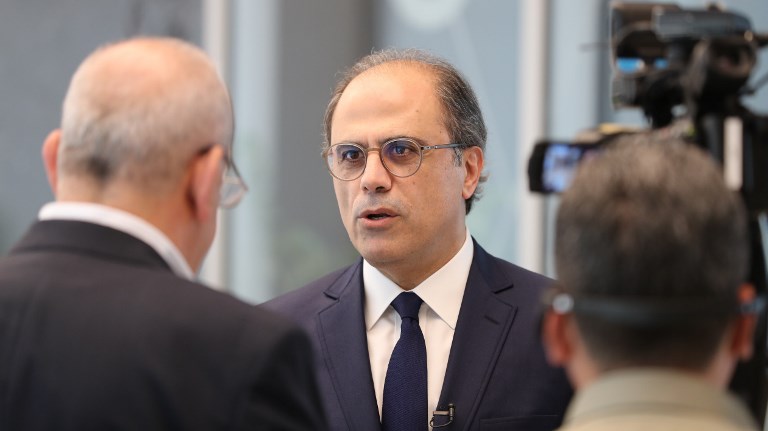São Paulo – The International Monetary Fund (IMF) released this Wednesday (2), in Dubai, United Arab Emirates, the report Regional Economic Outlook for the Middle East, North Africa, Afghanistan and Pakistan (MENAP) and underscored the document’s main five points. “To take full advantage of the growing global economy, the region should accelerate key economic reforms. The focus should be on improving the investment climate, boosting productivity, and strengthening governance,” said Jihad Azour (pictured above), the IMF’s director of the Middle East and Central Asia Department. Most of the countries analyzed are Arab, however, the study also includes non-Arab nations, such as Iran, Pakistan and Afghanistan.
The first point discusses the region’s growth recovery and states that it is not enough and that gains are fragile. The 1.7% GDP growth of oil-exporting countries in the region (Algeria, Libya, Saudi Arabia, Iraq, Yemen, Oman, Kuwait, Iran, Qatar, Bahrain and UAE) in 2017 was well below 2016’s growth, a reflection of the impact of oil production cuts agreed to by the Organization of the Petroleum Exporting Countries (OPEC). Despite this, these countries have seen a continuous and broad recovery in non-oil activity, in part as the result of a slower fiscal adjustment.
With OPEC’s agreement expiring at the end of 2018 and the following recovery of oil production, the year should see growth accelerate this year and the next. However, growth projection points to a yearly average of 3.6% in the 2019-2013 period, well bellow the previous levels seen before the decline of commodities’ international prices that began in 2014.
Meanwhile, the growth of oil-importing countries (Mauritania, Morocco, Tunisia, Egypt, Sudan, Djibouti, Somalia, Jordan, Lebanon, Syria, Afghanistan and Pakistan) reached 4.2% in 2017 and should go up to 4.7% in 2018, before reaching 5% on average per year from 2019 to 2023. However, this growth level should not create enough jobs for the demand – especially for the ear 23% of young people unemployed in the region.
The second item of the IMF’s report discusses the reasons for which the region is not fully benefiting from the global recovery. High levels of quick-rising debt forced the country to take significant measures to curb deficit, limiting government spending and searching for other sources of revenues. These steps should region to maintain the economy in order, controlling debt and inflation and creating an environment conducive to inclusive and sustainable growth, but they could also hinder economic growth.
The region’s countries should be more fully integrated to the global economy and diversify their products and services. This will demand greater access to finance for the private sector and the upgrading of workforce skills. The uncertainty around the price of oil, the increase in trade tensions and the effects of the region’s conflicts further constrained growth, and there are still risks.
The third point highlighted by the report states that strong monetary and fiscal policies are important, but not enough to generate growth. The increase in debt levels will limit the extent to which fiscal policy can boost short-term demand. As government work to reduce debt, they should try to broaden tax bases and improve the efficiency of spending, including the completion of reforms to energy subsidies. This will help to face continuous fiscal challenges and generate savings that can be directed to priority spending, such as healthcare, education and public investment.
The strengthening of monetary policy credibility will be crucial to anchor inflation expectations. In these circumstances, room to cut interest rates to encourage economic growth will be limited, even if inflation is moderate. Given the fixed exchange rate regime, the countries of the Gulf Cooperation Council (GCC) should adjust their monetary policy according to the anticipated rise in interest rates in the United States, which will impact growth from now on.
The fourth point of the report argues that the acceleration of structural reforms is crucial. The document states that the region’s countries should take advantage of the global recovery to accelerate structural reforms that will reduce their reliance on commodities and will help on the development of more dynamic private sectors. The reforms should focus on measures that improve business environment. The labor market and education reforms are also needed to increase productivity.
To strengthen governance and transparency to promote inclusive growth in the region is essential. Some countries are taking positive steps in this direction. For instance, Afghanistan recently launched a legislation to criminalize corruption, and anti-corruption laws also went into effect in Morocco, Somalia and Tunisia.
The fifth and last item points out that growth should offer opportunities to all. The countries should ensure that prosperity is shared. The IMF report identified some encouraging ongoing examples. The UAE made important investments in education and innovation, and Morocco recently launched a program to improve women’s participation in the labor force. Egypt doubled its budget for public nurseries to help integrate women to the labor market. According to the report, these are laudable actions, although a lot more should be done all across the region to take advantage of these efforts and accelerate this progress.
Translated by Sérgio Kakitani




